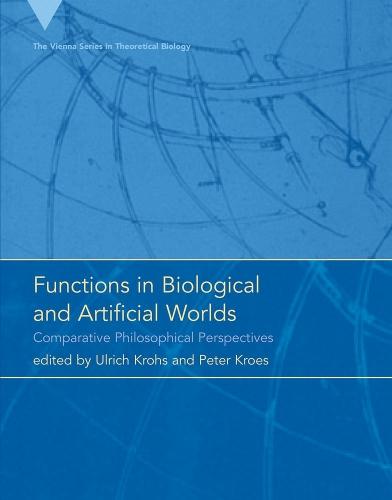Overview
Investigations into the relationship between organism and artifacts from the perspective of functionality. The notion of function is an integral part of thinking in both biology and technology; biological organisms and technical artifacts are both ascribed functionality. Yet the concept of function is notoriously obscure (with problematic issues regarding the normative and the descriptive nature of functions, for example) and demands philosophical clarification. So too the relationship between biological organisms and technical artifacts: although entities of one kind are often described in terms of the other—as in the machine analogy for biological organism or the evolutionary account of technological development—the parallels between the two break down at certain points. This volume takes on both issues and examines the relationship between organisms and artifacts from the perspective of functionality. Believing that the concept of function is the root of an accurate understanding of biological organisms, technical artifacts, and the relation between the two, the contributors take an integrative approach, offering philosophical analyses that embrace both biological and technical fields of function ascription. They aim at a better understanding not only of the concept of function but also of the similarities and differences between organisms and artifacts as they relate to functionality. Their ontological, epistemological, and phenomenological comparisons will clarify problems that are central to the philosophies of both biology and technology. Contributors Paul Sheldon Davies, Maarten Franssen, Wybo Houkes, Yoshinobu Kitamura, Peter Kroes, Ulrich Krohs, Tim Lewens, Andrew Light, Françoise Longy, Peter McLaughlin, Riichiro Mizoguchi, Mark Perlman, Beth Preston, Giacomo Romano, Marzia Soavi, Pieter E. Vermaas
Full Product Details
Author: Ulrich Krohs (Westfälische Wilhelms-Universität Münster) ,
Peter Kroes (Delft University of Technology) ,
Ulrich Krohs (Westfalische Wilhelms-Universitat Munster) ,
Peter Kroes (Delft University of Technology)
Publisher: MIT Press Ltd
Imprint: MIT Press
Dimensions:
Width: 17.80cm
, Height: 1.90cm
, Length: 22.90cm
Weight: 0.635kg
ISBN: 9780262113212
ISBN 10: 026211321
Pages: 312
Publication Date: 01 March 2009
Recommended Age: From 18 years
Audience:
College/higher education
,
Professional and scholarly
,
Postgraduate, Research & Scholarly
,
Professional & Vocational
Format: Hardback
Publisher's Status: Out of Stock Indefinitely
Availability: Out of stock

Reviews
This is a gem of a book. Focusing on the concepts of function in biology and technology, these rich articles open up many questions for further pursuit. The importance of Functions in Biological and Artificial Worlds extends beyond philosophy of biology and philosophy of technology into issues of general philosophical interest--for example, emergence, real kinds, function, and normativity. Functions in Biological and Artificial Worlds bristles with insights and provocative ideas. Highly recommended. --Lynne Rudder Baker, University of Massachusetts Amherst The roles of design and normativity continue to be a hotly debated topic in that part of the philosophy of biology concerned with function. This volume differs from most in being the outcome of a workshop in which early versions were discussed by the other authors. The result has the welcome feel of philosophical discussion rather than of the major players once again defining their territory. --Robert Cummins, Professor and Chair, Department of Philosophy, University of Illinois at Urbana-Champaign
""The roles of design and normativity continue to be a hotly debated topic in that part of the philosophy of biology concerned with function. This volume differs from most in being the outcome of a workshop in which early versions were discussed by the other authors. The result has the welcome feel of philosophical discussion rather than of the major players once again defining their territory.""--Robert Cummins, Professor and Chair, Department of Philosophy, University of Illinois at Urbana-Champaign ""This is a gem of a book. Focusing on the concepts of function in biology and technology, these rich articles open up many questions for further pursuit. The importance of Functions in Biological and Artificial Worlds extends beyond philosophy of biology and philosophy of technology into issues of general philosophical interest -- for example, emergence, real kinds, function, and normativity. Functions in Biological and Artificial Worlds bristles with insights and provocative ideas. Highly recommended."" --Lynne Rudder Baker, University of Massachusetts Amherst -- Lynne Rudder Baker ""This is a gem of a book. Focusing on the concepts of function in biology and technology, these rich articles open up many questions for further pursuit. The importance of Functions in Biological and Artificial Worlds extends beyond philosophy of biology and philosophy of technology into issues of general philosophical interest -- for example, emergence, real kinds, function, and normativity. Functions in Biological and Artificial Worlds bristles with insights and provocative ideas. Highly recommended."" Lynne Rudder Baker , University of Massachusetts Amherst
Author Information
Ulrich Krohs teaches philosophy at the University of Hamburg and is a member at the Konrad Lorenz Institute for Evolution and Cognition Research in Altenberg, Austria. Peter Kroes is Professor in the Philosophy of Technology, Delft University of Technology, the Netherlands. Ulrich Krohs teaches philosophy at the University of Hamburg and is a member at the Konrad Lorenz Institute for Evolution and Cognition Research in Altenberg, Austria. Peter Kroes is Professor in the Philosophy of Technology, Delft University of Technology, the Netherlands. Paul Sheldon Davies is Associate Professor of Philosophy at the College of William and Mary. Andrew Light is Director of the Center for Global Ethics at George Mason University and Senior Fellow at the Center for American Progress. Tim Lewens is University Lecturer in History and Philosophy of Science at Cambridge University.




